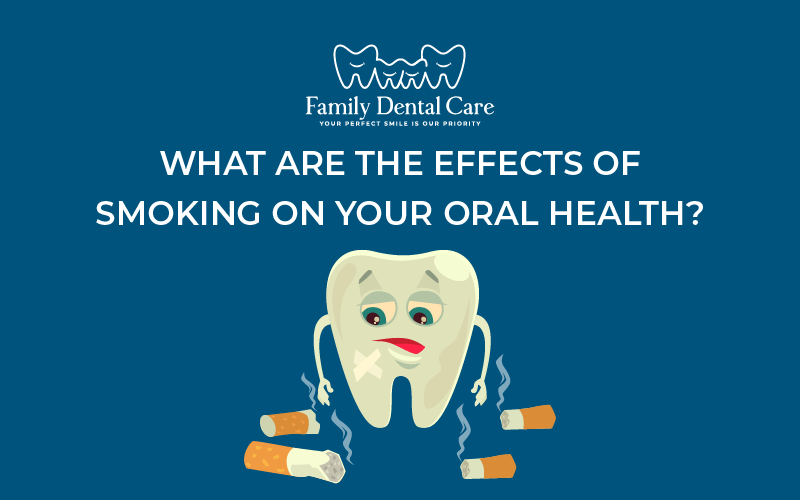Smoking is a harmful habit with numerous detrimental effects on our health, prominently known for its link to lung cancer and heart diseases. However, its adverse impact on oral and dental health, often evidenced by the condition commonly referred to as “smokers’ teeth,” also deserves significant attention.
For those prioritizing dental and oral care, regular check-ups and maintenance are crucial, yet smokers often overlook the role smoking plays in compromising their dental health. Despite recognizing the negative consequences of smoking on their oral well-being, many find it challenging to quit.
It’s crucial to remember that preserving oral and dental health is particularly challenging for smokers due to the serious health hazards posed by smoking. Not only does it affect lung health, but it also has a profound impact on oral and dental wellness, heightening the risk of various oral health issues and gum diseases for those who smoke.
Effects of Smoking on Oral Health

Smoking’s wide-ranging negative consequences on health include several specific impacts on oral and dental wellness, such as
1. Teeth Discoloration
Teeth staining is a common issue among smokers due to the chemicals in tobacco, which contribute to the yellowing or browning of teeth.
Nicotine, an addictive component of tobacco, and tar, a sticky residue, are major culprits in teeth discoloration, leading to significant aesthetic concerns and potentially affecting self-confidence and social interactions.
2. Tooth Decay
Tooth decay, a leading cause of tooth loss, is primarily driven by the erosion of tooth enamel, one of the main causes of tooth decay.
Tobacco’s chemicals, like nicotine and tar, wear down enamel, making teeth more susceptible to decay. This decay process, a key aspect of tooth decay symptoms and causes, is facilitated by the formation of plaque, which harbors bacteria that produce harmful acids, further damaging the teeth.
3. Gum Diseases
Smoking diminishes blood oxygen levels, weakening the immune system and making the oral environment more prone to infections.
This vulnerability heightens the risk of tooth and gum diseases, with smokers being notably more susceptible than non-smokers.
4. Oral Cancer
The risk of oral cancer escalates significantly with smoking, as tobacco’s harmful chemicals, including various carcinogens, induce cell mutations and compromise the body’s ability to repair DNA, facilitating the development of cancer in the mouth and throat areas.
5. Sensitive and Weak Teeth
Weakened enamel in smokers leads to increased tooth sensitivity and vulnerability to damage, making teeth more susceptible to temperature extremes and other irritants.
Despite the availability of specialized toothpaste and mouthwashes for smokers, these products often fall short of counteracting the extensive damage caused by smoking. Regular dental check-ups are essential for maintaining oral health and early detection of potential issues.
6. Bad Breath
Smoking-induced bad breath can strain both social and personal relationships due to the mouth’s dryness and irritation caused by smoking, which fosters the growth of odor-causing bacteria.
Quitting smoking is the most effective solution for improving oral health and alleviating bad breath, supplemented by diligent oral hygiene practices.
Tips to Mitigate Smoking’s Impact on Oral and Dental Health

To safeguard your oral and dental health—and overall well-being—it’s imperative to quit smoking. If quitting is not immediately possible, reducing smoking frequency and adhering to stringent oral care routines can help mitigate its effects. Key strategies include-
– Upholding superior oral hygiene is paramount in averting the accumulation of plaque and tartar, which are the primary culprits in dental discoloration and decay. Regular and thorough cleaning routines help maintain the natural whiteness and health of your teeth, contributing to a brighter, more confident smile.
– Adopting a rigorous dental care regimen, including brushing teeth at least twice daily, is essential. This practice, enhanced by thorough flossing and the regular use of mouthwash, forms a robust defense against the myriad dental problems caused by smoking, ensuring your mouth remains fresh and your teeth healthy.
– Seeking expert advice from dental professionals, such as those acclaimed as the best dentist in Simi Valley, is advisable for tailored teeth whitening solutions. These treatments, specifically designed for sensitive teeth, can significantly mitigate the discoloration effects of smoking, restoring the natural luster of your teeth while ensuring comfort during the process.
– Committing to frequent dental check-ups is a proactive measure to identify and address oral health issues promptly. Access to a wide range of services, including family dentistry for all your dental needs, catering to the diverse needs of all family members, and emergency dental care for urgent issues, ensures comprehensive support for maintaining optimal oral health.
Conclusion
Smoking carries substantial hazards to our oral and dental well-being, manifesting as tooth discoloration, decay, gum diseases, persistent bad breath, and even the grave risk of oral cancer. Smokers must place quitting at the top of their health priorities to shield their oral health.
This important step should be bolstered by consistent dental check-ups and a strong commitment to oral hygiene practices. Engaging in specialized treatments, such as teeth whitening for sensitive teeth, can also play a crucial role in alleviating the negative impacts of smoking.
By taking these steps, people can start a journey towards better overall health as well as a healthier smile. This will help people develop a deeper, more holistic view of health and a sense of self-care and respect for their bodies, which goes beyond simple aesthetics.

